Inside Tracks #18: Lambert & Potter "Don't Pull Your Love" w/Covers by Hamilton, Joe Frank & Reynolds, Glen Campbell, Grass Roots, Sam & Dave
Originally pitched to Grass Roots in 1970, they passed, calling it light-weight! Instead, H, JF & R had a hit with their Roots-ian horn-driven arrangement! Grass Roots began playing it live in 1996!
Lambert & Potter became favorite songwriters of mine in the mid-’70s, to the point that when I received a new promo single or stumbled upon a new record at a store that had their names on it (even as producers), I snapped it up, sound unheard!
And, like a favorite candy bar or soda pop, they never disappointed. I came to refer to them as creators of the “tightly-wound” pop song, always melodic, usually horn-driven, with never-meandering verses that always quickly got you to a memorable chorus with nary a misplaced note!
If a songwriter, enviable outcome; if a music-lover and appreciator of the craft (like myself), an impressive feat to experience (not unlike stepping back to admire an intricate edifice or bridge)!
Songs like “Two Divided by Love,” “The Runway,” “Ain’t No Woman (Like the One I’ve Got),” “Country Boy (You’ve Got Your Feet in L.A.),” “It Only Takes a Minute,” and yes, “Don’t Pull Your Love” are all a part of this instantly-recognizable concise and effective songcraft:
Lambert & Potter: Country Boys Got Their Feet in L.A.
Born in 1947, Brooklynite Dennis Lambert began his music career as a boy singer at Catskills rooms for four years (ages 10-14), when he signed to The Tokens’ production company in 1960 as a recording artist. By the mid-’60s, he was writing and producing for other artists. Among his earliest work with his first main collaborator, Lou Courtney (below), were songs for Freddie & the Dreamers (“Do the Freddie”), Lorraine Ellison, Jerry Butler and Jerry Lee Lewis.
In 1965, Lambert joined the Mercury Records A&R staff, where he was mentored by Quincy Jones (who had produced Lesley Gore albums two decades before setting sales records producing Michael Jackson’s hits), before joining (longtime Sinatra producer/arranger) Don Costa at DCP Records, where he ran the label’s A&R department, producing and writing songs.
After a spell in the US Army during the Vietnam War, he moved to L.A. in 1968, and the following year, forged a successful 11-year working collaboration with young British songwriter-musician Brian Potter after the two met while Lambert was in London in 1969.
Lambert and Potter joined a new, short-lived record label in L.A., Talent Associates’ TA Records (with 4 albums distributed by Bell Records in 1969-’70), founded by TV producer-director Steve Binder, where they worked as producers and songwriters.
When TA was put up for sale, the publishing assets were sold to ABC/Dunhill Records in 1971, and Lambert & Potter also joined the label. Lambert released a solo album, Bags & Things in 1972.

In 1974, they formed their own record label, Haven Records, and acquired a distribution deal with Capitol Records, with a Haven roster that included the Righteous Brothers (above), the Grass Roots, Evie Sands and Player. During this period, they also wrote and produced albums for Tavares and Glen Campbell for parent, Capitol.
Said to have been written with Elvis in mind, and first recorded as “Don't Pull Your Love Out” by the obscure Country Store in 1970 (written and produced by Lambert & Potter), “Don't Pull Your Love” had been optioned by ABC/Dunhill Records A&R vice-president (and longtime Grass Roots producer), Steve Barri, to be recorded by the Grass Roots.

Unbelievably, the band passed on the song, calling it “a bit light[weight],” despite being right up their alley, to these (and Steve Barri’s) ears!
Walking it back? Rob Grill of The Grass Roots later explained at a concert that “Don’t Pull Your Love” was indeed intended for his band, but that they were about to release another single. So, Lambert & Potter (and M. Kupps) wrote “Two Divided by Love” for The Grass Roots, which sounds somewhat similar to this song.
You be the judge (produced by Barri, horns arrangement by Jimmie Haskell; the song reached #16 in the U.S., #2 in Canada):
The fact that Rob Grill’s Grass Roots began including the song in their live sets as early as 1996 not only points to correcting their early boo-boo (another song possibly ready to release notwithstanding), but helps justify their place at the top of the Playlist, leading directly into Hamilton, Joe Frank & Reynolds’ smash recording (which, in the Land-of-What-Might’ve-Been, could’ve been the Grass Roots’ success)!
“Don’t Pull Your Love”: The Story of the Song
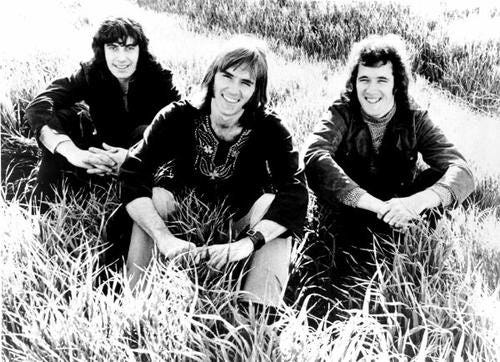
The guys who wrote [“Don't Pull Your Love Out”] actually put that record out a year before we got a hold of it [Lambert & Potter for Country Store].
We did it exactly like they did it...we liked the way the horns sounded and the way they had the tune structured. We literally kept that total arrangement on it.—Joe Frank Carollo
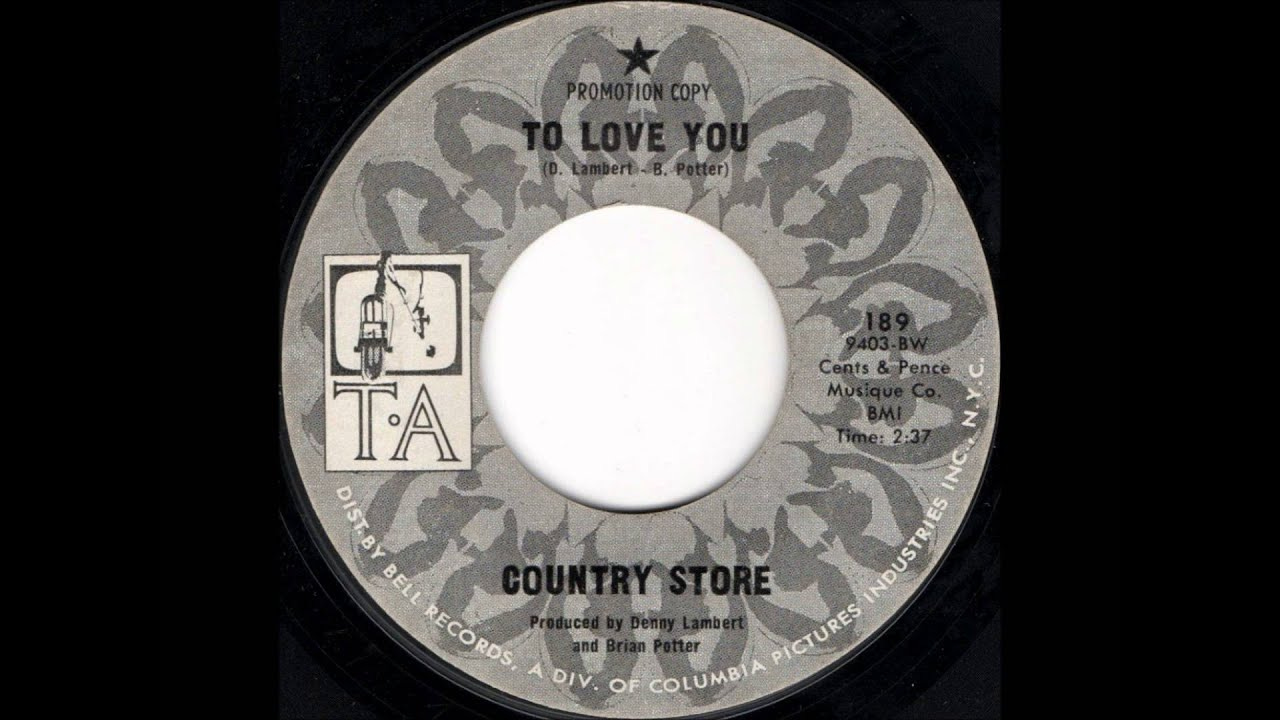
How the Song Found the Band (and Vice Versa)
Joe Frank Carollo, in a recent podcast interview with John Darlington, recalled how song and band met: “[Fellow band] members, Dan Hamilton, Tommy Reynolds, and myself were performing a Creedence Clearwater Revival medley to audition for ABC/Dunhill,” when Steve Barri stopped the trio to play them the demo of “Don't Pull Your Love” two or three times until they could sing it for Barri, who then arranged for Hamilton, Joe Frank & Reynolds to be signed to ABC/Dunhill that same day.
According to Barri, in a 1971 Record World trade publication interview, Hamilton, Joe Frank & Reynolds themselves played on the basic tracks for their December 1970 recording sessions, on which Jimmie Haskell’s horn and string arrangements were later overdubbed.
Additional credits on the sessions include drummer, Joe Correro Jr. – formerly of Paul Revere & the Raiders – and keyboardist/bassist Larry Knechtel. Both Correro (Joe Frank Carollo’s second cousin) and Knechtel were prolific session musicians with iconic L.A. session band, the Wrecking Crew.
“Don’t Pull Your Love” was released April 1971 and reached #4 on the Billboard Hot 100 in July. In Canada, the song spent a week at #1.
From a 1988 Solid Gold telecast, and synching to track, but because too few videos exist of H, JF & R playing and singing “live”:
Sam & Dave
The song was recorded at Muscle Shoals by former ‘60s Stax hitmakers, Sam Moore & Dave Prater, in 1971. Their version was released on Atlantic Records in October of that year, and reached #36 on the Billboard R&B chart.
The Glen Campbell Medley
The lead single from the 1976 Glen Campbell album Bloodline (Haven/Capitol), produced by Dennis Lambert and Brian Potter, was a medley of “Don’t Pull Your Love,” with the John D. Loudermilk composition, “Then You Can Tell Me Goodbye.”
Lambert and Potter were creatively responsible for Campbell’s massive 1975 comeback album, Rhinestone Cowboy. Glen’s “Don’t Pull Your Love”/”Then You Can Tell Me Goodbye” was far less successful than either of the singles off Rhinestone Cowboy (the title track, #1 on country, pop, and Easy Listening charts, plus “Country Boy (You Got Your Feet in L.A.,” #1 Easy Listening, #3 country, #11 pop charts). The medley just got into the Top 30 of Billboard’s Hot 100, topping out at #27.




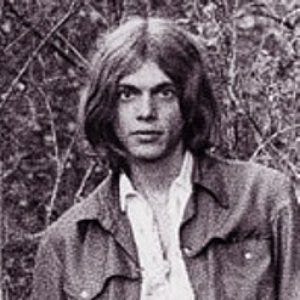



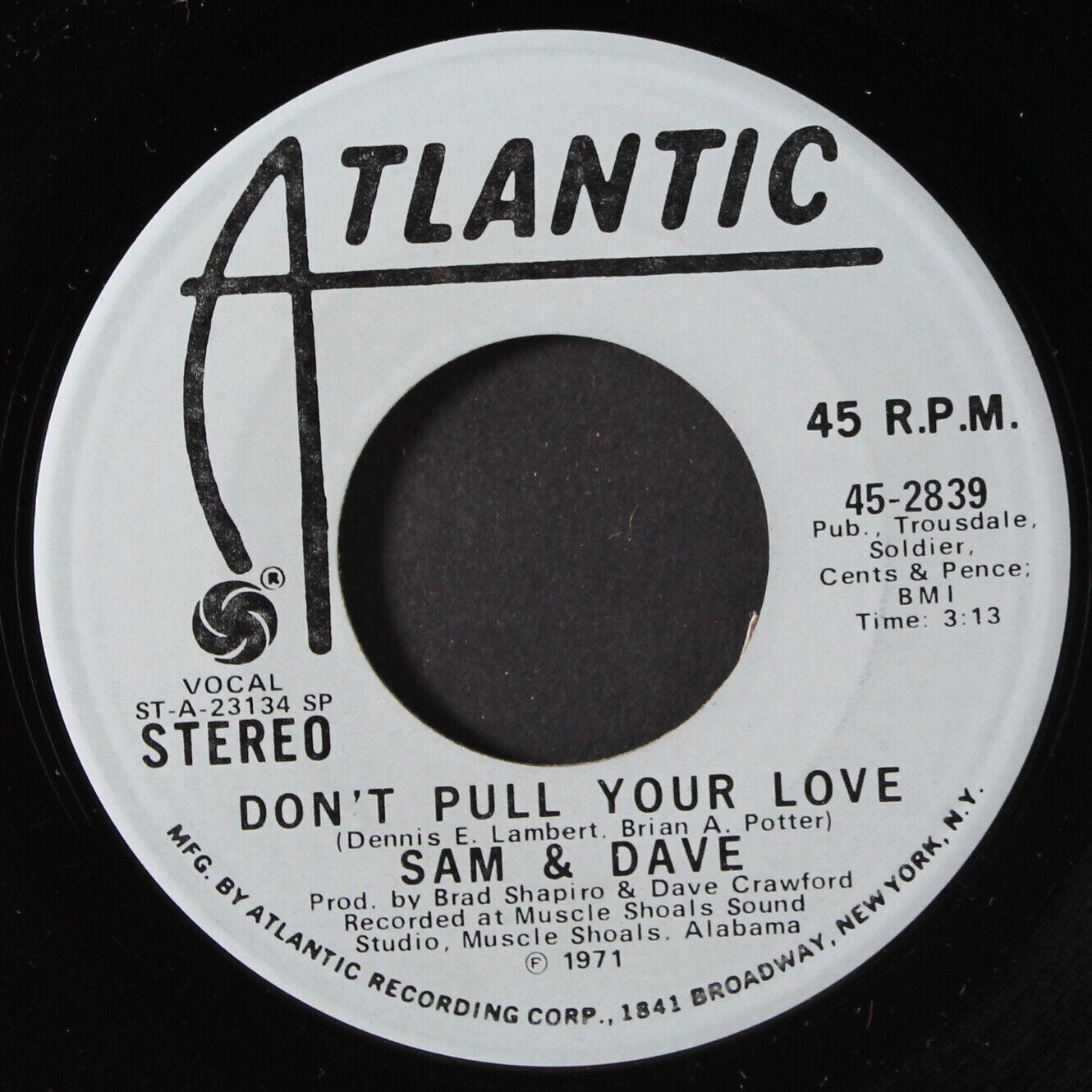
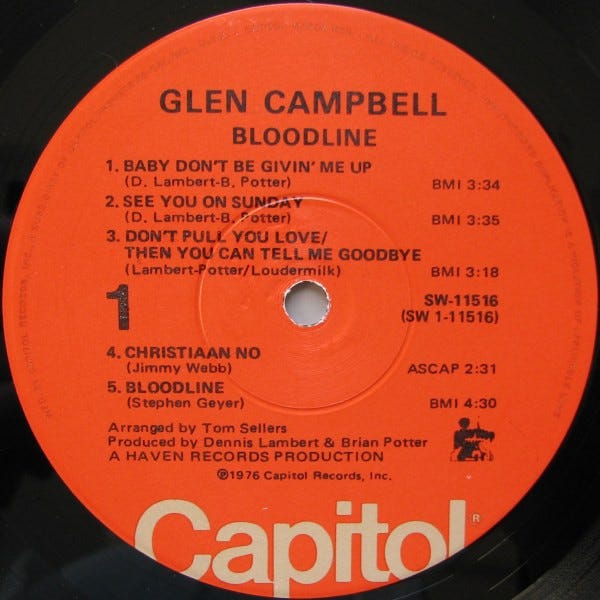


Very interesting, but for me the only version that comes close to bearable is the same and Dave one.
Great stuff, Brad! I’m always struck by how you pull out the interconnections between musicians and various publishing/recording/producing/promoting folks and entities and make them make some sense to me. Now do the LA freeway map!! I’ve only driven through some of it once, but that was enough for this farm kid....